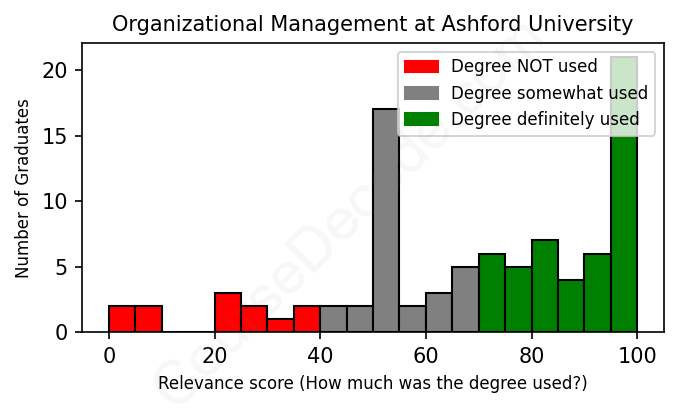
First, some facts. Of the Organizational Management graduates from Ashford University we've analyzed , here's how many have used (or NOT used) their degree in their career:

These are estimates based on AI analysis of 92 LinkedIn profiles (see below).
The verdict? Slightly above average. Overall, with an average relevance score of 68%, Organizational Management graduates from Ashford University have a slightly higher likelihood (+1%) of finding work in this field compared to the average graduate across all fields:
And for comparison, here's the chart for all profiles we've looked at across all degrees.
Also, after graduating, only 34% of these graduates have pursued further education other than another Bachelor's degree (such as a Masters degree or other), compared to the average across all profiles of 35%. This suggests a Bachelors degree is enough for most Organizational Management graduates, and it's normal to look for work straight after graduation.
See the details:
|
Relevance score: 67% We think this person has gone into a career only somewhat relevant to their degree. We think this person has gone into a career only somewhat relevant to their degree.
DEGREE INFOGraduated in 2014 from Ashford University with a Bachelor's degree in Organizational Management. No other secondary education since. JOB HISTORY SINCE GRADUATIONClinical Organizer Doctors Making Housecalls Aug 2014 - Jan 2015 Claims Processor  TrialCard Jan 2017 - Nov 2017 Reimbursement Case Manager  TrialCard Nov 2017 - Aug 2018 Program Supervisor  TrialCard Aug 2018 - Sep 2019 Data Analyst  TrialCard Sep 2019 - Apr 2021 Senior Data and Reporting Analyst  TrialCard Apr 2021 - Apr 2022 Master Data Analyst  Guerbet Apr 2022 - Present ABOUTI am a Process improvement professional with an extensive background in Excel and Crisis Solutions. I bring with me over 5 years in Leadership and establishing team standards, over 2 years in dedicated reporting and analytics, 2 years in Process improvement and 2 years of claims experience. I believe if given the opportunity my skill set will only continue to grow to allow me to best assist my team. |
The top 10 most common jobs done by the graduates we've analyzed (ranked most common to least) are:
When we look at the career trajectories of people who graduated with a degree in Organizational Management from Ashford University, there’s quite a diverse range of jobs that they’ve landed. Many of them took up roles where their degree was directly applicable, like operations managers, human resources positions, and project managers. For example, roles like Chief of Operations, Talent Acquisition Specialist, and Medical Office Associate Supervisor all show a clear connection to organizational management principles. These jobs typically require strong leadership, problem-solving, and strategic planning skills, which are core components of what’s taught in an Organizational Management program.
However, it’s not all clear-cut. While some graduates have certainly found applying their degree's teachings in their professions, others have landed in positions that barely scratch the surface of their Organizational Management knowledge. For instance, roles like Administrative Assistant, Sales Consultant, or even a stay-at-home mom don’t require much больше than basic organizational skills. In these cases, the job responsibilities often lean more towards administrative duties or customer service rather than utilizing the advanced management concepts learned during their education. So, even though there are significant highlights to celebrate in terms of relevant job placements, there are also quite a few examples where the relevance of their Organizational Management degree appears to diminish.
In summary, while many graduates have successfully parlayed their education into roles where they can flex their organizational management muscles, there’s also a notable number who found themselves in jobs that are only tangentially related. This showcases a mixed bag of outcomes and suggests that while a degree in Organizational Management offers a solid foundation, the application can vary widely based on individual career paths and job opportunities available.
Here is a visual representation of the most common words in job titles for Organizational Management graduates (this is across all Organizational Management graduates we've analyzed, not just those who went to Ashford University):

When looking at the career trajectories of graduates from Ashford University who majored in Organizational Management, a pretty diverse picture emerges. It seems like these graduates have ranged across various industries and job roles, each with their unique growth paths. Generally speaking, most of them seem to find jobs related to management or administrative roles soon after graduation. For example, early job titles include administrative assistants, HR coordinators, and operations managers, which suggests they quickly landed on their feet in positions related to their studies. However, some individuals took varied paths; a few have even been stay-at-home parents for a period before transitioning back into the workforce. That indicates that while some jump straight into relevant roles, others may take time to explore different avenues.
Fast forward five to ten years post-graduation, and the progression looks a bit more promising. Many graduates advance into more senior roles within their fields. For instance, roles like Operations Manager and Project Manager start to pop up, indicating a trend where individuals leverage their initial experiences to climb the corporate ladder. Additionally, there are graduates who have taken on leadership roles in reputable organizations or appear to have launched their own businesses, which is a huge achievement. However, it’s also worth noting that there are outliers who have shifted significantly away from organizational management roles—like becoming medical office supervisors or moving into sales and real estate. This shift might suggest that while some graduates remain dedicated to the principles of Organizational Management, others may have found fulfillment in entirely different fields.
In conclusion, while many graduates from Ashford University seem to secure career paths that are related to their studies in Organizational Management, there’s also a noticeable diversity in their professional journeys. While some have achieved commendable roles in relevant fields, others have taken unconventional paths, suggesting that the degree can serve as a versatile stepping stone rather than a strict career directive. As a whole, it looks like these graduates have the potential for solid career development, even if the routes taken are not always linear. It paints a picture of adaptability and growth over time, which is a great takeaway for anyone looking into a career in this area.
Honestly, a Bachelor’s degree in Organizational Management, whether at Ashford University or elsewhere, is generally considered to be on the easier side compared to some other majors. It often focuses on practical skills like leadership, communication, and teamwork, which can be more straightforward for many students. While you’ll still have to tackle some assignments and exams, a lot of the concepts are pretty relatable to everyday experiences and group projects, so it can feel less overwhelming. Of course, it all depends on your interest in the subject and how well you manage your time, but overall, it’s more about applying what you learn rather than memorizing a ton of complex theories.
Most commonly, in the LinkedIn profiles we've looked at, it takes people 2 years to finish a Bachelor degree in Organizational Management.
From what I can see, the graduates from Ashford University seem to have landed a range of jobs, some of which are pretty solid. For instance, there are quite a few folks working in leadership or specialized roles within the military and various corporate sectors, like operations management and project management. Those positions generally pay well, especially in the aerospace, health care, and tech industries. It looks like many of them have gradually climbed the ladder, starting from entry-level jobs and moving into more managerial and strategic roles, which typically come with better compensation packages.
However, not everyone seems to be making bank. Some graduates have taken on roles that are more administrative or support-based, which might not have the same earning potential as their counterparts in higher leadership positions. Plus, there are a few who seemed to juggle multiple roles or have switched industries, suggesting they might still be figuring things out financially. Overall, while there are some impressive salaries in the mix, it’s clear that the earnings can vary widely based on the paths they've chosen after graduation.
Here is a visual representation of the most common words seen in the "about" section of LinkedIn profiles who have a Bachelor degree in Organizational Management (this is across all Organizational Management graduates we've analyzed, not just those who went to Ashford University). This may or may not be useful:

Here are all colleges offering a Bachelor degree in Organizational Management (ordered by the average relevance score of their Organizational Management graduates, best to worst) where we have analyzed at least 10 of their graduates:
| College | Score | Count |
|---|---|---|
 Ashford University Ashford University
|
68 | 92 |
 University of La Verne University of La Verne
|
65 | 11 |